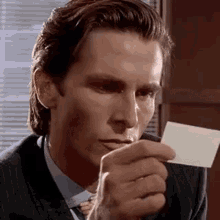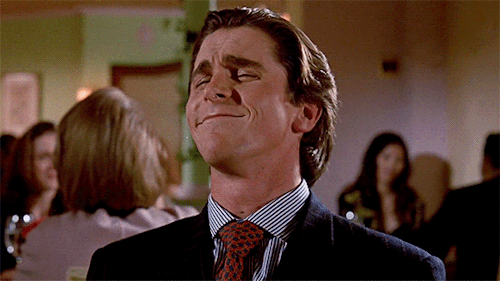Hold on… this isn’t beloved movie critic Aiden Herrod…
No, it’s not. Surprise! This newsletter is coming to you from the desk of Sinead Chang, amateur food writer of One More Bite fame, and (more importantly) close and personal friend of Aiden. Don’t fret—this is just a temporary and peaceful transfer of power. We’ve been tossing around this idea of pairing an iconic movie and restaurant and then swapping newsletters to publish reviews… and now we’re actually doing it. Our first pairing: American Psycho—one of my favorite movies of all time—and Smith & Wollensky.
The story of American Psycho (the movie), and the story of my own relationship with the movie, started with the book: Bret Easton Ellis, my problematic obsession. I can’t remember what prompted me to read the book three summers ago, right when I moved to New York. Perhaps I wanted some inspiration for my budding life in the big city—I was also watching Sex and the City at the same time. I had never seen the movie, nor read any of Ellis’s previous books. I dove head first into American Psycho with absolutely no warning of what was to come.
Honestly, reading American Psycho for the first time was kind of awful. Am I allowed to say that? It’s been awhile since I last read the book so I can’t remember the exact scene, but I vividly remember reading the book at my desk over a bowl of salad, and getting so sick to my stomach from the graphic detail that I couldn’t finish my lunch. But the book fascinated me in that sickening way that gory, violent books often do, and I watched the movie hunched over my laptop one night in bed. Christian Bale’s over-the-top performance as Patrick Bateman masterfully depicts him as arrogant and insecure all at once—and suddenly instead of horror, I was laughing… at him. Look at this sad, shallow man caring about sad, shallow things!
A few months later, in January 2023, I went to Bret Easton Ellis’s book release—he had just published his latest novel, The Shards, and I was deep into my phase of attending assorted cultural events around the city. Me being an aspiring autofiction writer (maybe… I’m not sure yet), he explained his novels in a way that I thought was quite thought provoking: he said that every book he’s ever written was due to a need to process some period of his life, and once he had completed the book, so too ended his internal turmoil, trauma, or whatever knots that needed to be kneaded. If only it were that easy… but maybe it is. I haven’t written a book!
And so my obsession with Ellis continued to grow (Less Than Zero is my favorite book of his, if you care), and I found myself six months later at the (Netflix-ified) Paris Theater, watching American Psycho with the director, Mary Harron. And I think this was the viewing where the movie really clicked for me: the crowd roared with laughter at every twist and turn—I vividly remember the crowd going crazy during the scene where Patrick Bateman (or, Christian Bale maybe?) admires himself in the mirror as he’s having sex. I don’t remember much from the talk back after the movie other than being extremely starstruck, but I think Harron confirmed, like I had suspected, that at its core, American Psycho is a laugh-out-loud funny movie.
The movie turns the novel into a wealth of visual, iconic references: I personally talk about the metal credit cards clinking onto the tray at the opening of the movie and the business card d*ck-measuring contest at least once a week. It’s behavior that I observe at a smaller scale all the time, especially as I’m surrounded by wannabe corporate worker bees, clout chasers chasing something that’s forever out of their reach. And no shade to them either, because we all have a little bit of Patrick Bateman within us. At his core, he’s just a small man trying his best to feel important in a big world… only to truly realize how insignificant and iterative we all are.
I rewatched the movie yet again in preparation for writing this. I put it on in the background as I was starting to write, and then suddenly found myself enthralled. There’s a lot happening in the movie, and honestly, I had always been too distracted to think much about the ending. And yet when I watched it this time around, I realized that the core thesis of this story is contained in the way that it ends: Patrick Bateman, finally confessing to his murders and believing himself to be deserving of punishment, gets away with it all. And whether or not he actually did commit all the crimes he’s depicted as doing doesn’t matter, in my opinion. He’s trapped in a spiral of irrelevance, where nothing he says or does will have any impact—my theory is that the movie can be looped infinitely, and the very next day Patrick Bateman will wake up and do 1,000 crunches… or whatever is in that diabolical morning routine… and continue on with his life.
So I guess now I feel bad for Patrick Bateman, and I see him as an exaggerated representation of what it means to participate in Corporate America. We’re all just interchangeable cogs in a machine, aren’t we, and do I really want that Acne Studios T-shirt, or am I just trying to project some sort of image outward in an attempt to fit in? And even if I’m aware of my own performative tendencies, is it even possible to stop? I’m spiraling.
American Psycho is a very good movie though, and I continue to stand by it being one of my favorites of all time, both for its iconic, often-memed scenes and greater cultural criticism. Perhaps don’t watch it if you’re feeling particularly existential, though, which I’ve made the grave mistake of doing. And on that note, I need to go return some videotapes.
Verdict: 1,000,000/5





